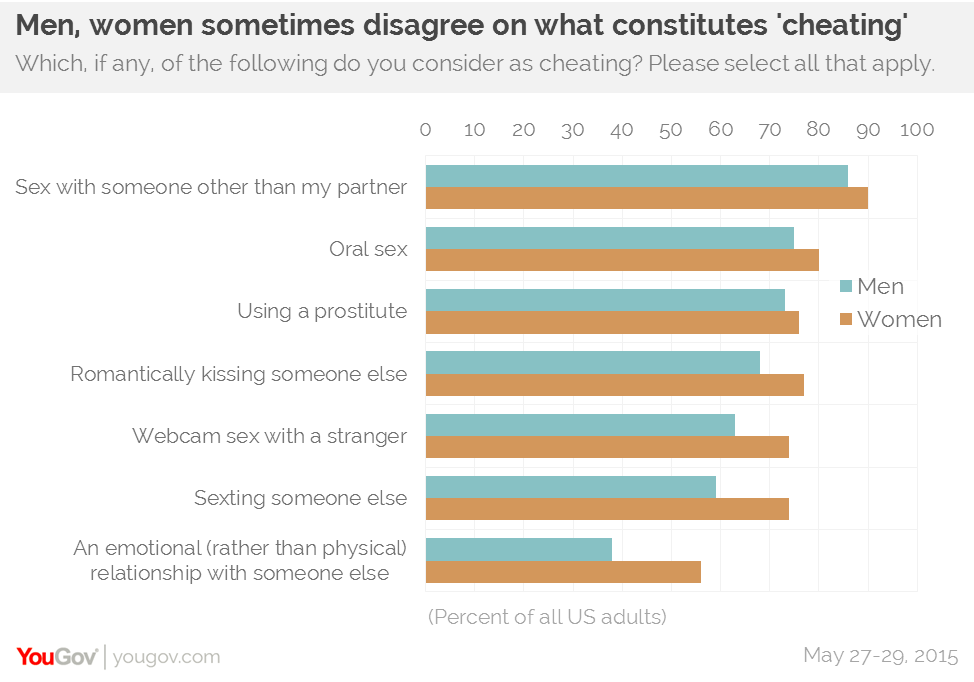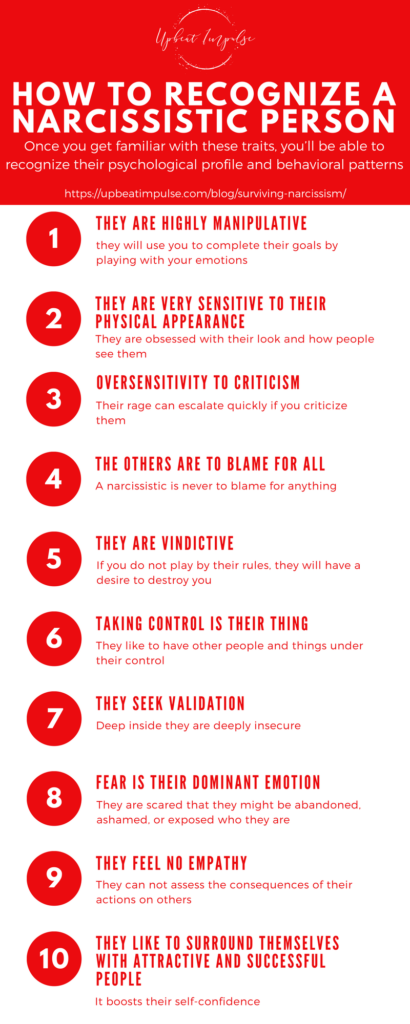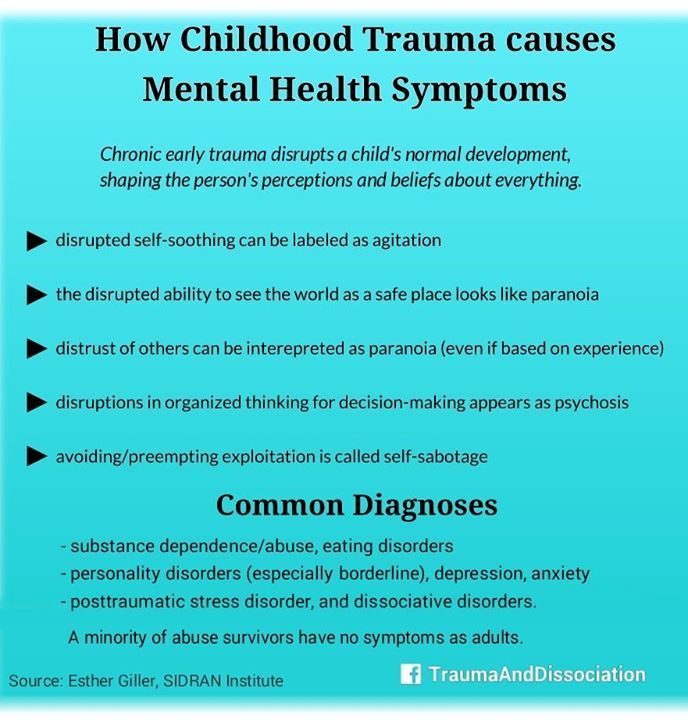What's considered cheating in a marriage
5 Different Types of Infidelity
The consequences of infidelity are numerous, and it is only natural to want to know why your partner chose to cheat, even if knowing why doesn't bring you any relief. There could be any number of reasons, and there are many types of infidelity and cheating that could shed a little light on those reasons.
What Is Infidelity?
Infidelity, or cheating, is the act of being unfaithful to a spouse or other partner. It typically means engaging in sexual or romantic relations with a person other than one's significant other, breaking a commitment or promise in the act.
Each case of infidelity is different and fulfills a different need. Although knowing why a partner cheated likely won't lessen any pain you feel, being able to rationalize the behavior and define it will alleviate some confusion. It can also help you feel more confident in how to move forward from the situation—whether that means working on healing your relationship or moving on should you decide to split up.
Learn more about the five types of cheating below, and what to do if you find yourself the victim of infidelity.
Opportunistic Infidelity
Opportunistic infidelity occurs when one is in love and attached to their partner, but succumbs to their sexual desire for someone else. Typically, this type of cheating is driven by situational circumstances or opportunity, risk-taking behavior, and alcohol or drug use. As social psychologist Theresa E. DiDonato says, "Not every act of infidelity is premeditated and driven by dissatisfaction with a current relationship…Maybe they were drinking or in some other way thrown into an opportunity they didn't anticipate."
After the fact, the more in love a person is with their partner, the more guilt they will experience as a result of their sexual encounter. However, feelings of guilt tend to fade as the fear of being caught subsides.
Obligatory Infidelity
This type of infidelity is based on the fear that resisting someone's sexual advances will result in rejection. People may have feelings of sexual desire, love, and attachment for a partner, but still, end up cheating because they have a strong need for approval. In addition, their need for approval can cause them to act in ways that are at odds with their other feelings. In other words, some people cheat, not because they want to cheat, but because they need the approval that comes along with having the attention of others.
People may have feelings of sexual desire, love, and attachment for a partner, but still, end up cheating because they have a strong need for approval. In addition, their need for approval can cause them to act in ways that are at odds with their other feelings. In other words, some people cheat, not because they want to cheat, but because they need the approval that comes along with having the attention of others.
Romantic Infidelity
"Sometimes (but not always) a deficit in an existing relationship leads people to have extradyadic affairs," says DiDonato. This type of infidelity occurs when the cheater has little emotional attachment to their partner. They may be committed to their marriage and making it work, but they long for an intimate, loving connection with someone else. More than likely, their commitment to the marriage will prevent them from ever leaving their spouse. Romantic infidelity means pain for the other man or woman and the cheating partner—rarely does it turn into a long-term, committed relationship. Marital problems have to be quite severe before a spouse will leave the marriage for another person.
Marital problems have to be quite severe before a spouse will leave the marriage for another person.
Conflicted Romantic Infidelity
This type of infidelity occurs when people experience genuine love and sexual desire for more than one person at a time. Despite our idealistic notions of having only one true love, it is possible to experience intense romantic love for multiple people at the same time. While such situations are emotionally possible, they are very complicated and tend to create a lot of anxiety and stress. In this case, cheating partners, in their attempt not to cause anyone harm, often end up hurting everyone.
Commemorative Infidelity
This type of infidelity occurs when a person is in a committed relationship but has no feelings for their partner. There is no sexual desire or love or attachment, only a sense of obligation keeping the couple together. "Lacking love and lacking commitment to a current romantic partner are both tied to general feelings of relationship dissatisfaction," says DiDonato.
These people justify cheating by telling themselves they have the right to look for what they are not getting in their present relationship. Unfulfilled sexual desires can easily come into play here. "Maybe in their established relationship, individuals aren't engaging in the frequency of sex, style of sex, or specific sexual behaviors that they want," DiDonato adds. "This can contribute to their reasons to cheat."
It is important, for the sake of appearances, that the present relationship last. The cheater does not want to be viewed as a failure, so they stay in an unhappy relationship and seek to fulfill their needs outside the relationship.
Next Steps After Being Cheated On
Now that your confusion has hopefully been alleviated, it's up to you to decide what steps to take next. Marriages and relationships can survive infidelity, but whether or not yours survives will depend on what type of infidelity took place and how much work you're both willing to put in. It's only common sense to know that an opportunistic cheater will cheat regardless of how many times their cheating is discovered and forgiven. That said, any other reasons why your spouse cheated don't mean they won't cheat again, so keep that in mind when deciding what steps to take next.
It's only common sense to know that an opportunistic cheater will cheat regardless of how many times their cheating is discovered and forgiven. That said, any other reasons why your spouse cheated don't mean they won't cheat again, so keep that in mind when deciding what steps to take next.
How to Deal With Infidelity, According to an Expert
10 Most Common Types Of Cheating In A Relationship
In This Article
There are gray areas when defining cheating in a relationship. It’s important to know when to draw the line if you’re the perpetrator or how to tell if your partner is cheating on you.
This article sheds light on the different types of cheating in a relationship and what constitutes infidelity.
What is cheating in a relationship?Webster’s dictionary defines infidelity as the act of having a romantic or sexual relationship with someone other than your partner.
Cheating or infidelity is not clearly defined as it can involve several things. It goes beyond being sexually involved with a person that isn’t your partner and can include having a deep connection with another person.
It goes beyond being sexually involved with a person that isn’t your partner and can include having a deep connection with another person.
Simply put, cheating is being unfaithful to your partner.
There are different types of cheating in a relationship, and it doesn’t only involve physical affairs. Instead, cheating seeks sexual intimacy, emotional attachment, or gratification from someone other than your partner.
Also Try: What Do You Consider Cheating QuizWhat is considered cheating?
What is cheating in a relationship? What constitutes cheating is dependent on the expectations of the relationship.
Except stated otherwise, a relation is bound by exclusivity, and a violation of this can be considered cheating.
What is considered cheating and the types of cheating in a relationship can vary depending on gender. So let’s first start with what women consider cheating.
A study revealed specific actions women count as cheating. The different types of cheating in a relationship, according to women, include
The different types of cheating in a relationship, according to women, include
Keeping your online dating profile active can imply infidelity even if you haven’t gone on a date yet. However, an online dating profile means you are keeping your options open.
This disrespects your partner and shows you are not exclusive in the relationship.
2. Being emotionally attached to another personGiving your attention to another person can count as cheating to women. For example, do you frequently text someone and dedicate your time to someone other than your partner? If you do, then most women will consider that as cheating.
Going to your friends for emotional support is not wrong, but your partner should remain your confidant.
3. Sending flirtatious messagesIn the above study, 60% of women considered sending flirty texts to somebody other than their partner as cheating. You’re crossing a line with the person receiving the texts and implying that you are available to take the relationship further.
Other acts women consider as cheating include:
- Going to dinner with someone you have feelings for
- Visiting a strip club alone or with guys
- Keeping in touch with your ex through social media
The following are actions men consider as cheating:
1. Sexual intimacyA 2014 survey by Victoria Milan, an online dating site, stated that 72% of men take sexual affairs more seriously than emotional ones. They are less likely to forgive their partners for being sexually involved with another person.
Men rarely view emotional attachment as cheating and are less likely to be bothered by it.
Related Reading: What Is Intimacy and 12 Types of Intimacy in a Relationship2. Not being exclusive
Men can consider an online dating profile as cheating. An online dating profile screams infidelity and signifies that you’re leaving your options open. Research at BBC shows at least 40% of men consider having an active online dating profile cheating.
There are different types of cheating, and it is easy to succumb to one if you don’t know the difference. Here are the common forms of cheating in a relationship.
1. Cheating sexuallyThis is one of the most common types of cheating in a relationship. This entails sexual intimacy with somebody that isn’t your partner. It is being unfaithful to your partner and is a breach of a couple’s sexual exclusivity.
Being sexually intimate with a person, not your partner is the most obvious sign of cheating. In most cases, this leads to a breakup.
An apparent sign your partner is cheating on you is if your sex life has taken a downturn. They will most likely not be interested in physical contact with you.
2. Online affairsAn online affair is one of the forms of cheating. It is a relationship with intimate and sexual undertones that thrives online through texts, calls, and video calls.
The parties may not even know themselves apart from the basic information such as age, profession, and physical appearance from pictures shared.
The parties involved in an internet affair may never meet each other, but their connection can affect their committed relationship. An online affair can evoke feelings of jealousy and anger in a partner.
Cyber infidelity can be regarded as betrayal and can break the trust in the relationship.
3. Financial infidelityThis cheating occurs when a partner doesn’t come clean about their spending or savings. For example, they could be going over the monthly budget to purchase gifs for their secret lover and, as a result, will hide their financial statement from their partner.
Another reason for lying about their finances can include a gambling problem, substance abuse problems, and even compulsive shopping. Financial infidelity also entails keeping secrets from your partner and breaking their trust in you.
A cheating partner will spend the savings and even put you in debt, and the worst part is that they will hide it from you.
4. Emotional cheatingThis involves being emotionally attached to someone other than your partner. This type of cheating is easily forgiven because it doesn’t include physical intimacy, but it can also ruin a relationship.
This type of cheating is easily forgiven because it doesn’t include physical intimacy, but it can also ruin a relationship.
When you’re emotionally involved with somebody, that person takes the role of your confidant, leaving your partner in the back seat of the relationship. Emotional cheating examples involve always confiding in someone other than your partner.
This, of course, amounts to cheating and can make your partner feel left out in the relationship.
Watch this video to learn more about emotional infidelity.
5. Fantasizing about someone else
It is normal to occasionally and briefly fantasize about a person you find attractive. But letting your mind wander and dream of acts that can lead to action can be considered cheating.
Spending hours daydreaming of somebody you find attractive will push you to act on it. Also, fantasizing will lead to dishonest and immoral acts or can take your mind off your relationship.
Also, fantasizing will lead to dishonest and immoral acts or can take your mind off your relationship.
You’re fantasizing about something that isn’t real and comparing reality to a dream. This can have disastrous consequences on your relationship.
For example, if fantasizing about your doctor will lead you to multiple trips to the hospital and lying about your location to your husband, you’re cheating.
6. Physical affair without sexMany people ask, “Is kissing cheating when in a relationship?” Just kissing someone who isn’t your partner can be regarded as cheating. You can’t escape the consequences of your action by saying, “We only kissed; we didn’t have sex.”
Participating in activities like foreplay or kissing someone other than your partner can still be considered cheating. However, the fact that sex wasn’t involved doesn’t make it less hurtful for your partner.
If you are confused about what actions can be considered cheating, it is best to talk it out with your partner. Relationships vary, and it is best you and your partner put all cards on the table and determine what actions will be considered cheating.
Relationships vary, and it is best you and your partner put all cards on the table and determine what actions will be considered cheating.
Having feelings for someone other than your partner can be considered cheating if such feelings are acted upon. This can be done by devoting your time to them and spending your savings to buy them expensive gifts.
It’s hard to control your feelings, but on the other hand, you have power over your actions. So, seeing the person you like behind your partner’s back and being secretive about your relationship with the person can be regarded as cheating.
There is no need to feel guilty over having feelings for someone else as it can’t be controlled. But for your emotions to count as infidelity, you have to act upon them.
8. Pouring your time and attention into a hobby
You can cheat on your partner with a hobby or interest. Devoting your attention and time to a hobby instead of your partner can constitute cheating.
Instead of spending time with your partner, you will play games, engage in physical activities or spend the weekend working.
This doesn’t mean hobbies are wrong; instead, they should be encouraged when done in moderation. Obsessing over an interest instead of giving your time to your partner can cause a rift in the relationship.
9. Micro-cheatingThis type of cheating involves developing inappropriate and intimate connections outside your relationship.
This is one of the common types of cheating in a relationship, and it consists of stalking your ex on social media, having an active online profile on a dating site, or flirting with other people. Micro cheating texting examples also involve sending flirty messages.
Micro-cheating is subtle and doesn’t involve physical intimacy. But the lies, secrecy, and betrayal that come with micro-cheating can destroy a relationship.
Related Reading: 8 Types of Betrayal in Relationships That Can Be Damaging10.
 Commemorative fidelity
Commemorative fidelityThis type of cheating happens when a person has fallen out of love and has no feelings for their partner. But they remain in the relationship because of an obligation.
These people justify cheating by arguing that their relationship has fallen apart and that it is not wrong to search for love outside.
Takeaway
Now that you know the different types of cheating in a relationship, monitoring your actions and avoiding acts that can hurt your partner will become easier.
Learning about what cheating is and the types of cheating will help you avoid ruining your relationship.
What is considered treason and what is not? 5 main types of infidelity
Everyone has a different idea of cheating. If you ask ten people about it, you will probably get ten different answers - everyone has their own ideas about what is acceptable and what is not. Some consider short correspondence to be cheating, others only sexual relations with someone else, and in polygamous relationships the boundaries are completely different. However, infidelity can be divided into several main categories, because infidelity usually involves at least one of three elements: secrecy, emotional involvement, and sexual alchemy. And this is the division that relationship experts came up with.
However, infidelity can be divided into several main categories, because infidelity usually involves at least one of three elements: secrecy, emotional involvement, and sexual alchemy. And this is the division that relationship experts came up with.
Vita Zorina
Tags:
voice compilation
Relationship psychology
Treason
GettyImages
1. Physical connection outside of a relationship
More specifically, touching, kissing, and intimacy with a person who is not your regular partner. Interestingly, this type of cheating does not depend on whether the relationship is monogamous or not. Open relationships also have boundaries (for example, the gender of the "external" partner, whether he is familiar with the main one or not, and so on).
2. Strong feelings
Emotional cheating is another way to cross the line. It includes love, infatuation or romantic feelings for another person. Of course, partners should not look only at each other all their lives, they can communicate with others, but only until such time as this communication becomes disrespectful to the "half".
3. Fantasizing about another person
Fantasizing about someone is normal, but only if you share these thoughts with a partner. And if you hide and feel that you are ready to kiss someone other than your partner, this can become a problem.
4. Concealment of the financial situation
Yes, monetary treason is also possible, omissions affect both partners. For example, if you decided to save money for a vacation, and you bought unnecessary things in the store, you actually changed your agreement.
ADVERTISING - CONTINUED BELOW
5. Secret social media habits
This variant is relatively recent, but has become widespread over the past few years. For example, if you constantly monitor the behavior of your ex or periodically check "new arrivals" on dating sites, you are already crossing the line. Another option: you prefer to read new posts on social networks instead of communicating with a partner.
In any case, in order to understand where the border between norm and betrayal lies, you need to discuss this with your partner. You can probably get away with almost all of the above with his approval.
reasons not to give in to temptation
Marital fidelity is the cherished standard of all marriages. No matter how people swear allegiance to each other, statistics show the opposite, and oaths in eternity are increasingly ironic.
Why do couples face infidelity, and a person who once seemed impossible to stop loving becomes less attractive in an intimate way? What is considered cheating in marriage - where is the line after which there is no turning point?
- 1 What counts as adultery?
- 2 Common causes of cheating
- 2.
 1 Men
1 Men - 2.2 Women
- 2.
- 3 Is there a legal punishment for cheating on a wife/husband?
- 4 How not to cheat in marriage and prevent the infidelity of the second half?
What is considered cheating in marriage?
There is no universal answer to this question - each person determines the limits for himself. Some couples do practice open relationships, considering this option the only form that will allow them to keep the marriage as long as possible, and will not let feelings fade away.
This phenomenon has its pros and cons. On the one hand, this is an understanding that a partner cannot be limited in freedom of action, and on the other hand, it negatively affects the canonical concepts of a normal marriage and morality.
Those who are especially jealous cannot endure such a pace of life, burning with the single thought that their spouse can be with someone else.
Many wives and husbands forgive companions after physical infidelity, because the moral aspect is more important for them. Here the rule is: you can sleep with some, and think about others. Indeed, it is terrible to realize that a loved one can be nearby, but at the same time mentally hover with another, yearn for someone else.
Here the rule is: you can sleep with some, and think about others. Indeed, it is terrible to realize that a loved one can be nearby, but at the same time mentally hover with another, yearn for someone else.
Practice shows that physical betrayal can be overcome if it is limited to only an intimate relationship, without admixture of feelings, but with the spiritual part, everything is more complicated.
Common reasons for cheating
Marriage is a serious step, which means that each partner is ready to spend a whole life with each other. Many psychologists, writers and others have repeatedly expressed the idea that love is work.
One should not think that everything happens by itself. You can’t get married / marry and stop taking care of yourself, be 100% sure that once you have been loved, they will never stop loving you.
What are the reasons men and women cheat most often:
- interest in another person;
- "drunk shop";
- intimate life has become boring;
- dissatisfaction;
- in retaliation (both were changed in the family).

Men
Historically (and this causes a wave of negativity on the part of modern women) that the representative of the stronger sex has the right to cheat.
As some say: "The main thing is to bring money into the house." And someone is really satisfied with this way of life, because the status of an official wife, and not a mistress, is much more important. A man is less emotional in physical relationships. Roughly speaking, he can easily sleep with someone and behave as if nothing had happened. It is also worth considering such a factor as self-expression.
In the dominant male nature there is such a fad - the more the better . Some like to show off the number of women, as if convinced of their sexuality and superiority. Diaries with a list of conquered girls are not fiction.
One of the common reasons is the loss of interest in a woman. Once upon a time, a man was ready to carry his “half” in his arms, to make him the happiest, but the years (in some cases even months) have given the feelings freedom to fade away.
The process of intimacy has become commonplace, every time the same thing - there is nothing to surprise. Some women allow themselves not to take care of themselves at all. It is worth remembering: if a man married a well-groomed girl with a slender figure, depilated parts of the body, he wants to see her always like that.
Even if for the sake of decency he says the opposite, it is rather for the sake of respect, but in his heart the “hunter” wants to have a beautiful woman who is able to excite him.
Dissatisfaction in bed leads to the fact that a man looks for it on the side. At home, he observes a tired wife after work, who tries to look good only for colleagues and business partners, and comes into the bedroom already without makeup, in some oversized T-shirt.
A mistress will meet with an impeccable appearance, beautiful underwear, and will not load problems after work. Routine often overshadows the desire for intimacy, loading up on household chores and killing all the feelings for which the couple once swore eternal love on the altar.
Routine, loss of interest, desire for self-affirmation, drunkenness are the most common causes of a man's infidelity. Do not deny other aspects that are individual and may have references to the psychological nuances of the individual.
Women
Of course, women have the same reasons for cheating that occur in men. But their nature is characterized by a more developed emotionality, intuition. If a man enters into intimacy with her out of habit, without love, she will feel it.
It is important for a woman to be aware of her need, to understand that she is desirable. Otherwise, she will find herself a more gallant, sensitive lover.
There is no one to share problems at work and experiences with - the husband is deaf to understanding and indifferent. In such a situation, there is a need for someone who is ready to listen, to ask about how the day went. Often, such a listener can be a colleague from work or an old acquaintance who wanted to take care of a girl, but went unnoticed.
It is at such moments that the time comes for men who want to achieve a woman at any cost, giving her a strong shoulder and a sea of love. Often husbands stop surprising their spouses with courtship, beautiful deeds, believing that this place only in the candy-bouquet period.
Contrary to stereotypes, some women can cheat no less than men. Perhaps the spouse does not feel satisfied in bed, or maybe the man is often absent, being constantly at work or on long business trips.
Researchers note that although cheating on the part of both men and women is similar, for the latter, the reason to go “to the left” should be more important and serious than for the former. Most likely, the wife is radically dissatisfied with something, the problem has been brewing for a long time, as well as the idea of treason.
Men should be more attentive and sensitive to their wives - remember how good it was with your chosen one in the first months or years of dating, try to become the same gallant and courteous again.
Is there a legal punishment for cheating on a wife/husband?
In many countries, betrayal is punished not only by moral remorse, but also by a blow to finances and freedom. For example, Muslims strictly punish wives, up to and including imprisonment.
In Switzerland, an unfaithful spouse is not allowed to remarry for three years after a divorce. In China, desecration of loyalty can deprive half of the property.
In Russia there are no special punishments for adultery, but the indecent behavior of a husband or wife can play a decisive role in who gets the child and property.
Practiced, but extremely rare, is a marriage contract, which spells out various nuances that may arise during a divorce. Perhaps for some, this form of marriage is skeptical and is equated with automatic distrust of a partner. But foreign experience proves the benefits of such innovations.
Perhaps for some, this form of marriage is skeptical and is equated with automatic distrust of a partner. But foreign experience proves the benefits of such innovations.
Dear readers! To solve your problem right now, get a free consultation - contact the duty lawyer in the online chat on the right or call:
+7 (499) 938-66-24 - Moscow and region
+7 (812) 425-62-38 - St. Petersburg and the region
8 (800) 350-97-52 - Other regions of the Russian Federation
You will not need to waste your time and nerves - an experienced lawyer will take care of all your problems!
How not to cheat in marriage and prevent the infidelity of the second half?
If a situation has arisen in your life that "smells" like a possible betrayal, and you give full account of it, don't worry, all is not lost yet.
The good thing is that you are already aware of the aspect that has arisen, so you can control it:
- first, try to avoid the object with which you can commit adultery.
 Talk to the person, explain that you are married and love your other half. Be categorical and frank with yourself - this is the only way you can resist the "serpent tempter";
Talk to the person, explain that you are married and love your other half. Be categorical and frank with yourself - this is the only way you can resist the "serpent tempter"; - secondly, go to a psychologist. It can be either individual therapy or family therapy. The first is suitable for those who cannot open up to their companion in hidden desires, the second will be an ideal occasion to sort out family problems and understand what went wrong;
- Thirdly, remember that once you commit one betrayal, you can continue. A normal and fulfilling marriage cannot exist on the same side with lies and false promises of love. Respect yourself, think about the feelings of the chosen one - imagine how it will hurt him when he finds out about the betrayal.
In the case when you feel that you can change, remember one thing: thinking about it, you are programming yourself for a specific outcome of the situation and you yourself can lead your partner to infidelity by your actions, tantrums.














